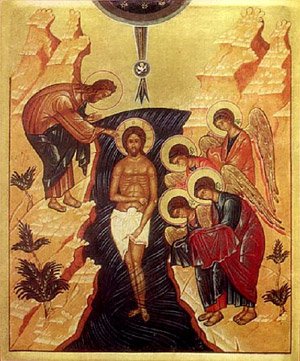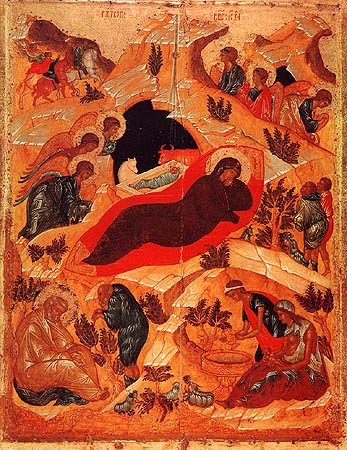News
-

THE HOLY THEOPHANY (BAPTISM) OF OUR LORD GOD AND SAVIOR JESUS CHRIST
20 January 2011
“The significance of Jordan cannot be overestimated, for the historical role of the river goes beyond all rational calculations,” wrote the famous archeologist Nelson Gluck about this muddy, somber, and in places dangerous river.
According to the Old Testament book of Joshua the son of Nun, stones were put into the waters of the Jordan in memory of the miraculous crossing of the Israelites across the river as though it were dry land; blessed Jerome, who lived in the Holy Land in the ninth century, testifies that these stones were still visible during his time. It was there, near Bethabara (which means ford), that the last Prophet of the passing, Old Testament, was baptizing the people. Pointing to the white slippery boulders, solemnly, he said:
“And think not to say within yourselves, We have Abraham to our father: for I say unto you, that God is able of these stones to raise up children unto Abraham” (Matthew 3:9).
However, according to other commentaries, the Baptist, by stones, meant the gentiles, yet it is difficult to understand where, in the crowd surrounding the prophet, could be found any noticeable number of those, who did not keep the law of Moses. One way, or another, yet the pilgrims used to carry away, and they do it to this day, from the holy river broken pieces of stone, filed and rounded by the streams of Jordan’s waters; and are not all of us made sons unto Abraham out of them?
“Water is the beginning of the world, Jordan is the beginning of the Gospel”, says St. Cyril of Jerusalem. As in the second verse of the book of Genesis, on the day of the Baptism, the Spirit of God once again was hovering over the water, over the wet brown (“which reached to extremities” – church historian Nicephoras Callistos) hair of Christ, and God the Father, Himself, the Lord of Hosts, in the expression of one of the contemporary church author, did not hold back and exclaimed: “This is My beloved Son, in Whom I am well pleased!”
In the year 28, having come to Bethabara, which was located a few kilometers away from the Dead Sea, the Lord knew “what He was doing, and what He was doing it for” (Prot. A.V. Gorskiy). “Jesus Christ asks for baptism for Himself, as a symbol of the repentance for the sins of mankind,” we read in one of the festive homilies. However, is it correct here, is it applicable here, the very meaning of the symbol?
“He comes to the waters of the Jordan in order, to wash the sins of publicans and sinners, says St. John Chrysostom, oh, the new wonder! Oh, the unspeakable grace! Christ completes the feat, yet I receive the honor; He struggles with the devil, yet I am the victor; He is baptized, yet the defilement is removed from me…”
And the Forerunner, filled with the prophetic spirit, knows that now, before his eyes, the Lamb of God takes upon Himself the sins of the world, and, as a man, he tries to halt Him:
“I must be baptized by Thee, and comest Thou to me?!” (Matthew 3:14)
Three years later, His Apostle Peter asked Him in the same way:
“Lord! Dost Thou wash my feet?” (John 13:6)
The answer was similar: “Suffer it to be so now: for thus it becometh us to fulfil all righteousness.” Thus did the Lord answer John the Forerunner. And here is the answer for Peter: “What I do thou knowest not now; but thou shalt know hereafter” (John 13:7).
John agrees right away, the disciple first argues, but in both cases the Gospel ministry of Christ is fulfilled to the end.
“…St. Paisios the Great prayed for his disciple, who renounced Christ, and when he was praying, the Lord appeared to him and says: “Paisios, for whom are you praying, he renounced me?” Yet the saint continued to pity his disciple and then the Lord said to him:
“Paisios, you became like unto Me through love.”
Thus is peace acquired and apart from this, there is no other way” (St. Silouan of Athos. About peace).
Christ, in the words of the same St. Silouan, was “sorrowful for the people to such an extent,” that He went to the death on the cross for their sake.
Here, on the Jordan was the beginning of the way of the cross, the way that leads to Golgotha and Resurrection.
“The voice of the Lord upon the waters is crying out, saying: come, receive ye all the Spirit of wisdom, the Spirit of knowledge, the Spirit of the fear of God, of Christ manifest. Today the nature of water is sanctified, and the Jordan is parted, and it turns the streams of its waters, beholding the Master being baptized” (from the service of the feast).
-

Nativity epistle of His Grace, Bishop Gabriel
6 January 2011
Dear in the Lord, fathers, brothers and sisters!
The spiritual significance of the events of the Gospel history, one way or another connected with the birth into the world in the flesh of our Lord, God and Savior Jesus Christ, is truly precious for the pious Christian conscience.
“As God of the world and Father of compassions, Thou hast sent to us Thine Angel of great Council, Who granteth us peace. Wherefore, guided to the light of knowledge divine, and rising at dawn out of the night, we glorify Thee, Who lovest mankind,” is sung in the 5th ode of the Nativity canon.
We see, that long before the coming of the Messiah-Christ, He was already called “Angel of great Council of God”. And in these days of the solemnities of Nativity He, Christ-Child, having become Man, came to earth, to us – people, granting us peace. What does it mean, to have spiritual peace? It means humbly to accept the course of our life, including sorrows and injustices. One cannot live without them, yet in the eyes of true followers of Christ, they – at least on the day of the Feast – seem to be too insignificant to disturb the spiritual peace of those, who came to know that today with us is the Angel of great Council, “Who brought the very heaven into the cave in Bethlehem”, – according to the words of the Most Blessed Metropolitan Anthony, founder of our Church Abroad.
Every little detail of the Nativity events is full of salvific meaning. Let us recall how the righteous Joseph the Betrothed met the news that the Virgin Mary committed to his care was found to be with child. From the words of the canon of Nativity with learn that the meek elder was overcome by the “tempest of doubting thoughts.” Separately, we should note that he was not yet granted the full comprehension of exactly what events his was a witness and participant. The Betrothed remained humble, meek and fully submitted to the will of God, unwaveringly believing in its goodness and justice. In response to his meekness and humility, the Lord, wishing to comfort and strengthen His faithful servant, sent to him in a dream His Angel, who revealed to him the greatest mystery of the creation of the world: “Joseph, thou son of David, fear not to take unto thee Mary thy wife: for that which is conceived in her is of the Holy Spirit.” (Matthew 1:20).
How often all of us are faced with temptations, which stir us up, incline us toward wrath and irritability. Yet let us not forget that it is not given unto us to understand the true meaning of what is happening in the world “according to our own desires.” Let us ask of the Lord meekness, humility and kindness. Maybe the merciful Lord will see our faithfulness and efforts, and will grant us the understanding of the salvific meaning of the events, which cause us alarm and confusion. “Bow before the manger of beasts, through which you, who became irrational, were nourished by the Word,” says St. Ephraim the Syrian, and then our souls will be filled peace and joy in Christ.
CHRIST IS BORN! GLORIFY HIM!
GABRIEL
Bishop of Montreal & CanadaNativity of Christ, 2011






